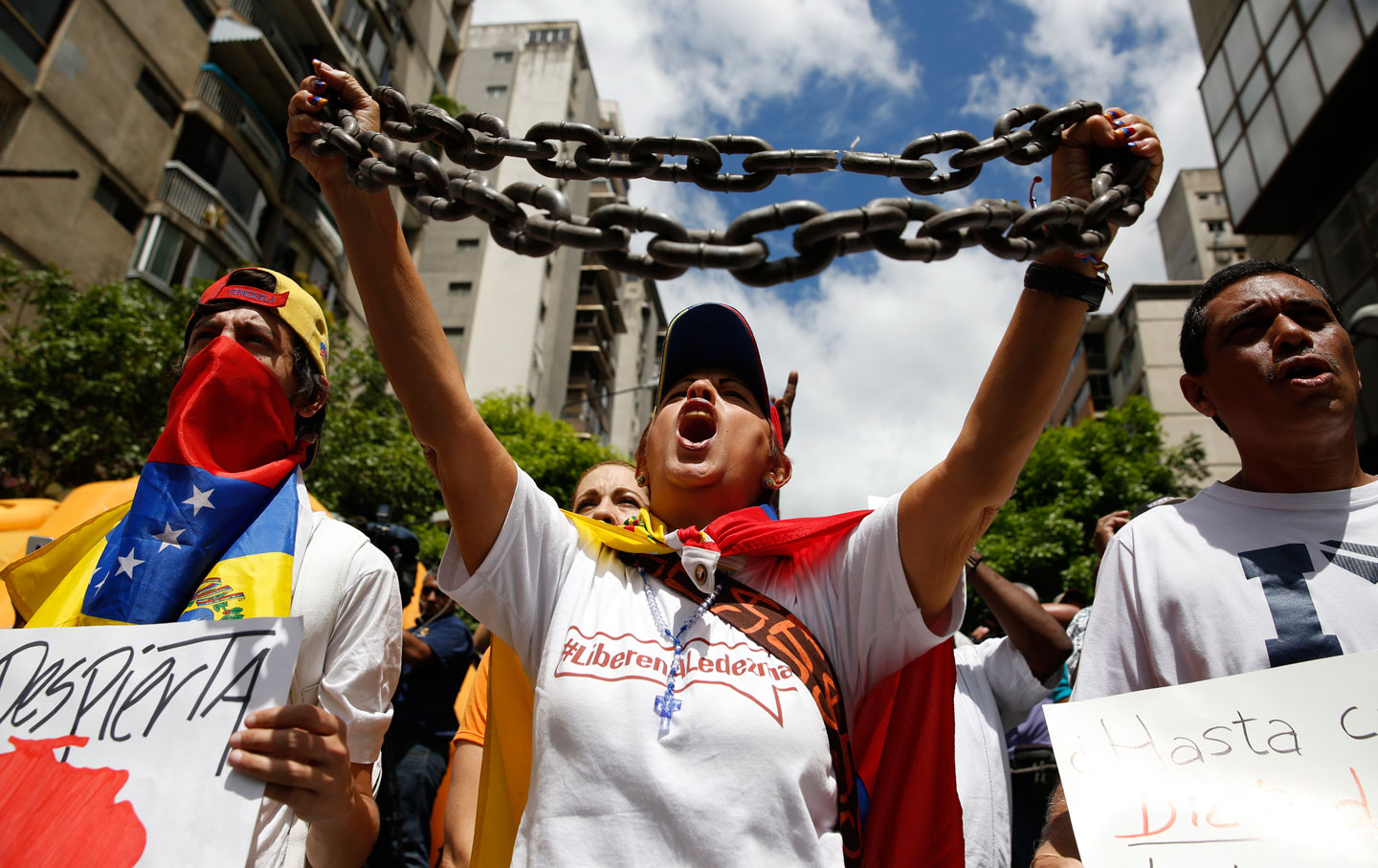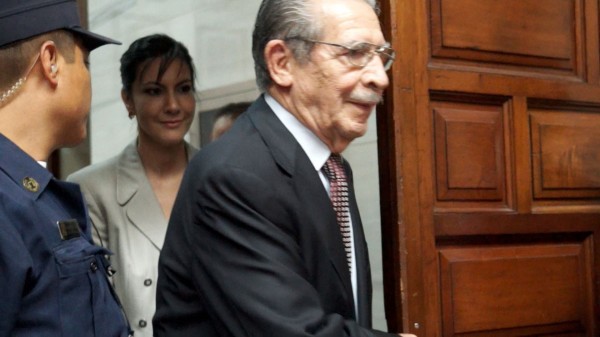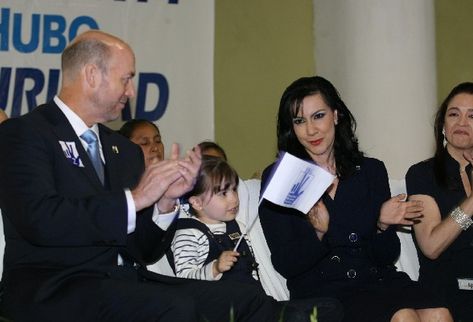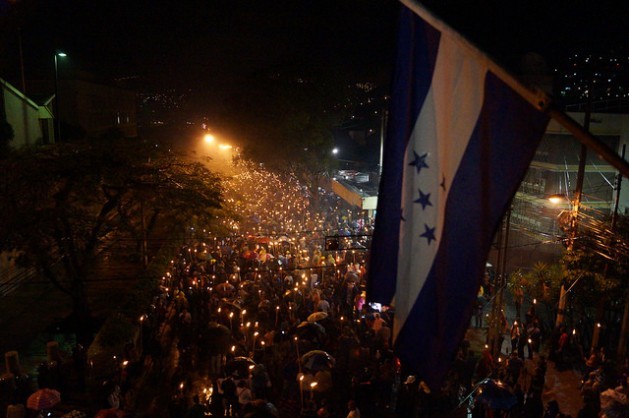Judi Lynn
Judi Lynn's JournalLeopoldo López Is Not Venezuela’s Savior
Leopoldo López Is Not Venezuela’s Savior
Despite US support, the revolutionary has only succeeded in pushing like-minded opposition leaders far, far away.
By Greg Grandin
Yesterday 11:58 am

Roberto Lovato has just published a great investigative essay in Foreign Policy on Leopoldo López, the jailed darling of Venezuela’s opposition. López is celebrated in the US press as a cross between Gandhi and Martin Luther King Jr. He is handsome, like King, and, like Gandhi, occasionally shirtless. Newsweek blushes over López’s “twinkling chocolate-colored eyes and high cheekbones.” He is, apparently, a “revolutionary who has it all”: an “attractive and supportive wife, two children who get along with each other and impossibly adorable Labrador puppies.” Everything except a revolution.
Drawing on WikiLeaked cables, Lovato reveals how López over the years has been handled by the US embassy in Caracas. (Roberto told me that 15 minutes after a colleague of his posted the FP article on social media, someone from the US embassy e-mailed and said, “You should really come to me when it comes to Venezuela.”) Despite this support, though, López remains a divisive figure within Venezuela, and Lovato’s piece helps explain why the opposition can’t get its act together, despite opportunities offered by serious economic problems and rampant corruption.
A few years ago, not long after Hugo Chávez’s March 2013 death and the razor-thin election of Chávez’s successor, Nicolás Maduro, López was at the center of a middle-class putsch attempt, protests that resulted in numerous deaths. It was as if all the rich, white gentry from LA’s Beverly Park started building barricades and stringing steel wire from lamppost to lamppost to decapitate motorcycle taxi drivers (as what happened to Venezuelan Elvis Durán), with the US media reporting on events as if it were Selma 1965.
Following these protests, López was arrested “on charges of arson, public incitement, and conspiracy.” His arrest got international attention, but, Lovato writes, “López’s trial has proceeded largely without fanfare…. López’s court dates in Caracas have generally attracted only small groups of supporters outside the courthouse, led by Lilian Tintori, López’s wife. Other key opposition leaders have stayed away, though they routinely voice support for López’s release. A recent campaign by his party, Voluntad Popular, to convene an assembly to rewrite the constitution and reorganize the government attracted criticism, with the leader of a rival opposition party calling for ‘responsibility and maturity’ and one opposition governor calling for an end to ‘anarchy or guarimbas,’ the street barricades that were the preferred tactic of López’s youthful followers.”
López’s claim to lead the Venezuelan opposition rests on his insistence that he had nothing to do with the failed April 2002 coup against Chávez. But Lovato nicely shows this insistence to be a lie. Then mayor of a rich Caracas municipality, López was everywhere those April days, rallying crowds, appearing on TV. His “most controversial episode,” as Lovato describes it, was leading a crowd to surround the house where a Chávez minister was laying low, picking up a megaphone to charge the minister with murder: “Justice will be imposed,” López said. López’s anti-Chavistas beat the minister in the street and then kidnapped him. López, in other words, is a thug. Ted Cruz with a mob.
More:
http://www.thenation.com/article/leopoldo-lopez-is-not-venezuelas-savior/
Former AK-47 Dealer Goes Cyber, Supplied Surveillance Tools to Honduras Government
Former AK-47 Dealer Goes Cyber, Supplied Surveillance Tools to Honduras Government
Lee Fang
July 27 2015, 1:24 p.m.
Ori Zoller made headlines over a decade ago selling thousands of AK-47s that eventually found their way into the hands of terrorists in Colombia.
Now, according to recently leaked documents, the former small arms dealer is working as cyber arms dealer, supplying the government of Honduras with powerful surveillance tools used to spy on computers and cell phones.
The revelations are contained in the internal files and emails from Hacking Team, an Italian company that has sold spyware to repressive regimes and law enforcement agencies around the world, including Sudan and the United Arab Emirates. The Hacking Team files were dumped on the web by an anonymous source.
Zoller, a former member of the Israeli special forces, acted as the middleman for Hacking Team to sell its surveillance equipment to the Honduran government, a relationship that was formalized in July 2014, according to Hacking Team records. The records show the Hondurans paid at least $355,000 for the software, which is used to seize control of a target’s computer or cell phone, with the ability to track an individual’s movements, log their keystrokes and even activate their computer camera.
More:
https://firstlook.org/theintercept/2015/07/27/ak-47-arms-dealer-goes-cyber-supplied-surveillance-tools-honduras-government/
For a Glimpse of Plan Central America's Future, Look to Colombia
For a Glimpse of Plan Central America's Future, Look to Colombia
Posted 27 July 2015 17:51 GMT
In an attempt to curb the flow of thousands of unaccompanied children who flee to the US, the Obama administration has proposed ‘Plan Central America’: a US $1 billion aid program for improving the economic and security situation in El Salvador, Guatemala and Honduras, collectively known as the Northern Triangle. The US Congress is expected to vote on it later this summer.
When Vice President Joe Biden presented the plan in an op-ed in the New York Times, he argued for increased training and support for police and armed forces, measures to increase transparency and accountability including strengthening tax collection and encouraging foreign direct investment through market liberalization.
The plan, the vice president wrote, will be modelled after Plan Colombia, continuing a Washington tradition of coupling neoliberal projects with military aid. A similar approach was applied in Mexico with the 2008 implementation of the Mérida Initiative. All three plans have in common a belief that complex social and economic problems, and the outcomes of these, such as a rampant narcotics industry, can be resolved through ramped-up military and security spending.
Revisiting Plan Colombia can be instructive as to what could lie ahead. For over ten years, it provided Colombia with over US $9 billion in military and financial aid aimed at fighting the narcotics industry. As one of the original designers, Biden argues that the program led to “notable improvements in security, governance and human rights”.
More:
http://globalvoicesonline.org/2015/07/27/for-a-glimpse-of-plan-central-americas-future-look-to-colombia/
Washington Post: Do the world’s ‘uncontacted’ tribes deserve to be left alone?
Do the world’s ‘uncontacted’ tribes deserve to be left alone?
By Ishaan Tharoor July 23
For the first time, anthropologists working for the Peruvian government will attempt to make contact with members of a remote tribe living in the Amazon jungle. The move follows growing concerns about the behavior of the Mascho Piro people, which has included attacks and raids on neighboring communities.
South America, and in particular the vast Amazon region, is home to some of the world's last remaining "uncontacted" tribes -- indigenous communities that, for whatever reason, have managed to exist almost entirely outside the purview of the nation-states in which they technically live. Experts fear a whole slew of risks that may follow should these tribes come into full contact with the outside world, from exploitation by rapacious mining and logging companies to the devastating transfer of pathogens to which they have no immunity.
In recent decades, some governments have taken a protective stance, working to shield these communities from outside contact mostly because of the health risks involved. After all, some estimates suggest contact with outside diseases killed up to 100 million indigenous people following the European arrival in the Americas.
Peru bars contact with about a dozen "uncontacted" Amazonian tribes living within its borders, a positive departure from an earlier time when the government would not even recognize their existence. Brazil has its own federal agency responsible for indigenous peoples. In 2011, it allowed cameras to document unprecedented aerial footage of its observations over the jungle.
More:
https://www.washingtonpost.com/blogs/worldviews/wp/2015/07/23/do-the-worlds-uncontacted-tribes-deserve-to-be-left-alone/
Guatemala: Ex-dictator’s daughter clear for presidential run
Guatemala: Ex-dictator’s daughter clear for presidential run
Jul 2015 Friday 24th
GUATEMALA’S Supreme Court has ruled that the daughter of former dictator Efrain Rios Montt can run for president.
The decision on Wednesday clears the way for Zury Rios Sosa to be selected as presidential candidate for her father’s Christian conservative Vision with Values (Viva) party.
Guatemala’s constitution bans relatives of dictators or coup leaders from contesting presidential elections.
The Supreme Electoral Tribunal had applied the rule to block Ms Rios Sosa’a candidacy on three previous occasions. But on July 16 she sought a Supreme Court injunction to overturn the tribunal’s latest decision.
More:
http://www.morningstaronline.co.uk/a-c3ea-Guatemala-Ex-dictators-daughter-clear-for-presidential-run#.VbQUKs9RGbw
[center]
As you may remember, the genocidal dictator's daughter, Zury
Rios Sosa married Republican former Congressman Jerry Weller.

Zury Rios Sosa following her father, the mass murdering, mass torturing genocide specialist,
beloved by right-wing actor Ronald Reagan & US fundie evangialists, Efrain Rios Montt through the door.


 [/center]
[/center]
What Endures From the Ancient Civilizations That Once Ruled the Central Andes?
[center] The Inca Road
 [/center]
[/center]
What Endures From the Ancient Civilizations That Once Ruled the Central Andes?
To journey here is to roam through almost six thousand years of civilization, to one of the places where the human enterprise began
July 22, 2015
Huayna Capac had a problem: He didn’t like his hometown, Cusco, in the bracing heights of southern Peru. Unfortunately, Cusco was the center of the Inca Empire, and he was the empire’s supreme ruler. Running the empire obliged him to spend a lot of time in the chilly capital city. Fortunately for Huayna Capac, he was king. With a word he could command thousands of his subjects to build a second capital. Huayna Capac said the word. His new capital was near the Equator, in what is today Quito, Ecuador. The palace was bigger and more luxurious than the first. And the weather was nearly perfect.
The king was pleased with his new digs but now faced a second problem. More than a thousand miles of steep, rugged mountains separate Quito and Cusco. The royal personage required a comfortable passage between them. He ordered hundreds of villages to dispatch all their able-bodied men to build a highway. The finished roadway was lined with guesthouses for travelers and so straight and flat, the chronicler Agustín de Zárate later marveled that you “could roll a cart down it.” Pleased with what he had conjured into existence, the king ordered up a second huge thoroughfare, this one along the coast.
The Inca highway network—the two main arteries and the mass of secondary courses that joined them—was arguably the biggest, most complex construction project ever undertaken. Running for 3,700 miles between Chile and Ecuador, about the distance from New York to Paris, the backbone of the system cut through every imaginable landscape, from icy mountain peaks to tropical lowlands, from the world’s driest desert to one of its wettest forests. It astounded the Spaniards who saw it—the conquistador Pedro de Cieza de León said that the road through the Andes should be more famous than Hannibal’s route through the Alps. “In the memory of people I doubt there is record of another highway comparable to this,” he wrote in the 1540s. It was called the Qhapaq Ñan—which translates from the Quechua as “Road of the Lord.”
Huayna Capac died around 1527, still seeking to incorporate the northernmost parts of the Andes into the empire. His death set off a civil war, fought bloodily along the Qhapaq Ñan. European conquerors arrived in 1532, accompanied by European diseases: smallpox, measles, typhoid, influenza. More than half the population of the Andean realm died. For the next three centuries, Spain tried to wipe out the histories and traditions that remained. But the conquistadors did not succeed. Native peoples tenaciously held on to their beliefs and practices. And archaeologists discovered ever more about the pre-conquest past.
Read more: http://www.smithsonianmag.com/travel/ancient-civilizations-central-andes-180955910/#wWVfjo4K0VUUIpqb.99
More photos.
Aspen Ministers Forum Releases Letter to President Juan Manuel Santos
Aspen Ministers Forum Releases Letter to President Juan Manuel Santos
Group expresses strong support for the efforts to end the war in Colombia
WASHINGTON, July 23, 2015 /PRNewswire-USNewswire/ -- WHAT: The Aspen Ministers Forum, a group of former Foreign Ministers who meet regularly under the auspices of the Aspen Institute, released a letter on July 22, 2015, to President Juan Manuel Santos of Colombia, outlining their strong support for the efforts underway to negotiate an end to the war in Colombia.
In their letter to President Santos, the Ministers write: "we believe in what you are trying to accomplish and stand ready to assist in any possible way, because there is no cause more important than the cause of peace."
WHO: Signatories to the letter are:
Madeleine K. Albright – United States
Lloyd Axworthy – Canada
Shlomo Ben Ami – Israel
Lamberto Dini – Italy
Don McKinnon – New Zealand
Marwan Muasher – Jordan
Surin Pitsuwan – Thailand
Malcolm Rifkind – United Kingdom
Adam Daniel Rotfeld – Poland
Knut Vollebæk – Norway
WHERE: The full letter is available online at http://www.aspeninstitute.org/sites/default/files/content/docs/asg/AMF%20Berlin%20Colombia%20Letter%20%28English%29.pdf
http://www.prnewswire.com/news-releases/aspen-ministers-forum-releases-letter-to-president-juan-manuel-santos-300117913.html
10 former Chilean soldiers charged in Victor Jara killing
Source: Associated Press
Jul 23, 4:39 PM EDT
10 former Chilean soldiers charged in Victor Jara killing
By LUIS ANDRES HENAO
Associated Press

SANTIAGO, Chile (AP) -- A judge has charged 10 former soldiers in the killing of internationally renowned Chilean folk singer and political activist Victor Jara, who was tortured and shot to death just days after the country's 1973 coup.
The charges announced late Wednesday by Judge Miguel Vazquez include homicide and kidnapping in the slaying of Jara and former military police head Littre Quiroga Carvajal.
Jara was a popular songwriter, theater director and university professor at the time of the coup on Sept. 11, 1973. He also was a member of the Communist Party, and many believe he could have served as a powerful voice against the dictatorship of Gen. Augusto Pinochet.
A key leader of the New Chilean Song movement, Jara was familiar to young people worldwide in the late 1960s and early 1970s for songs including "Te Recuerdo Amanda," or "I'll Remember You Amanda," and "Manifiesto."
Read more: http://hosted.ap.org/dynamic/stories/L/LT_CHILE_VICTOR_JARA?SITE=AP&SECTION=HOME&TEMPLATE=DEFAULT&CTIME=2015-07-23-16-39-54
Young Hondurans Lead Unprecedented Anti-Corruption Movement
Young Hondurans Lead Unprecedented Anti-Corruption Movement
By Thelma Mejía
 [font size=1]
[font size=1]
The rain has not stopped the ever-growing weekly torch marches organised by the Outraged in the capital of Honduras and
50 other cities around the country. The peaceful protests are demanding the creation of an International Commission
Against Impunity, to combat corruption and strengthen democracy. Credit: Thelma Mejía/IPS
[/font]
TEGUCIGALPA, Jul 21 2015 (IPS) - A Honduran spring is happening, led by young people mobilising over the social networks, who are flooding the streets with weekly torch marches against corruption and impunity.
Since late May, the peaceful movement of young people who declare themselves “indignados” or outraged has broken down the media’s resistance to cover what is happening, and has brought hundreds of thousands of people out on the streets in Tegucigalpa and 50 other cities around the country.
The torch marches are demanding the creation of an international commission to fight corruption and impunity, purge this Central American country’s institutions, and strengthen democracy. The Oposición Indignada or Outraged Opposition citizen movement is largely made up of middle-class young people upset over the embezzlement of 200 to 300 million dollars in the country’s social security institute (IHSS).
According to the investigations, some of the money was used to finance the right-wing National Party (PN), which has governed the country since 2010. The scandal also involved the purchase of equipment at marked-up prices, and of expired medications.
More:
http://www.ipsnews.net/2015/07/young-hondurans-head-unprecedented-anti-corruption-movement/
Officers Arrested in 1986 Burning Death of U.S. Student in Chile
Source: New York Times
Officers Arrested in 1986 Burning Death of U.S. Student in Chile
By PASCALE BONNEFOY
JULY 21, 2015

[font size=1]
Photographers raised their cameras in honor of Rodrigo Rojas during a 2003 ceremony in Santiago for victims of the Chilean
dictatorship. Mr. Rojas was set on fire during a protest in 1986. Credit Victor Rojas/Agence France-Presse — Getty Images
[/font]
SANTIAGO, Chile — A judge on Tuesday ordered the arrest of two former army officers and five former noncommissioned officers accused in the 1986 killing of Rodrigo Rojas, a United States resident, and the serious injury of a young woman. The two were set on fire by members of three military patrols during a protest in Santiago.
The warrants are part of a continuing investigation by Judge Mario Carroza into the burning, one of the heinous crimes committed during the 17-year dictatorship of Gen. Augusto Pinochet. The case was reopened in 2013 when a human rights organization filed a criminal complaint in Chile on behalf of Mr. Rojas’s family. By Tuesday evening, all seven of the accused had been taken into custody.
Last year, a former soldier testified and identified an official who he said had set the two on fire. The former officers were the commanders of two military patrols involved: Lt. Julio Castañer and Iván Figueroa. The commander of the third patrol, Lt. Pedro Fernández, was exempted because he had already been sentenced by a military court in 1991. The judge did not issue arrest warrants for the 17 soldiers said to have obeyed their orders.
Mr. Rojas, a 19-year-old photographer and student at Woodrow Wilson High School in Washington, had returned to Chile in May 1986 to rediscover his birth country and take photographs along the way. He grew up in the Chilean exile community in Washington, the son of Verónica De Negri, a political exile and supporter of Salvador Allende, the socialist president.
Read more: http://www.nytimes.com/2015/07/22/world/americas/officers-ordered-arrested-in-1986-burning-death-of-us-student-in-chile.html?_r=0
Profile Information
Member since: 2002Number of posts: 160,515